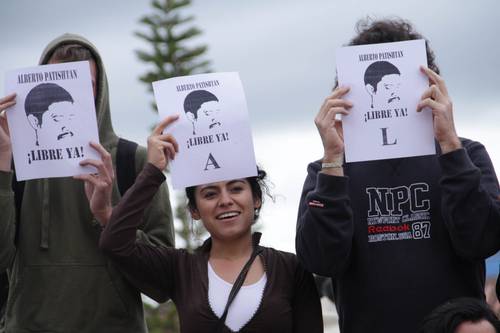We Recognize Ourselves in Patishtán and Sántiz López; They Suffer for Us: John Holloway

“Wave after wave of protest for the liberation of Alberto Patishtán and Francisco Sántiz López, letter after letter arriving from every part of the world, we recognize ourselves in them, we recognize that they are suffering for us,” expressed the thinker and university professor of Irish origin John Holloway upon adding his name to the demand of the second worldwide week for the liberation of the two Chiapas indigenous prisoners, the first an adherent to the Other Campaign, and the second a Zapatista National Liberation Army (EZLN) support base.
For his part, Gustavo Esteva, a columnist for La Jornada, also maintained: “Patishtán has spent more than 10 years in a prison unjustly. We cannot close our eyes and stand shoulder to shoulder, adding him to the long list of political prisoners, nor calm ourselves by thinking that Francisco Sántiz has only been in prison for six months. The prison of these two compañeros must weigh on us as if it were our own prison. Because it is.”
The struggle of the indigenous for their freedom is “impressive,” writes Holloway in a letter to the prisoners; it is a struggle of “everyone who dreams that he or she can still have a future, a dignified life.” Their incarceration is “simply another demonstration that capitalism has no place for Humanity.”
The current system “is a constant attack, a machine of destruction that wants to destroy all who are not subordinate to its logic of money, who are opposed to the logic of profit, but doesn’t achieve it because there are people like Alberto and Francisco that say ‘No,’ that they are not going to accept it.” Millions more “are not going to accept it,” because “we are with them in prison” and “so that they breathe and live, so that we may breathe; we may live, we must bring down the walls of the prisons of Chiapas, the prisons of the world, the prison system,” Holloway concludes.
At his turn, Esteva announced from his “Oaxacan corner” that he adds “heart, hope and energy” to these demands for freedom: “We must break the bars on the head romper that leads to thinking that by changing some little things or individuals up above everything is going to be fixed. And later we must break the chains that still bind our hands and feet and impede us from getting the conquest of our autonomy started in every part of the world in which we live. Only those autonomies, guaranteed in each place and linked in solidarity everywhere permit us to get out of prison.”
In May, during the first week of worldwide struggle, groups and individuals “from all parts of the United Kingdom” sent letters to the Mexican Embassy in London by mail, fax, electronic mail, and even by hand. To begin the second week of struggle, the solidarity groups demanded an answer, which, very characteristically, was “that there was no one at the Embassy that was able to answer the questions.” Personnel from the delegation suggested calling “next Monday.”
The British groups also published a solidarity message from organizations in Turkey: “We see all those who struggle for freedom in the world, as our compañeros. We make a call to all the rebels that have the fire of freedom in our hearts and that are from Athens, Amed, Chiapas, Gaza, Toronto or Seattle. You are not alone, there are people in other lands also struggling.”
English translation by the Chiapas Support Committee for the:


